
An Exploration & Commentary on Unlocking Leadership Mindtraps by Jennifer Garvey Berger
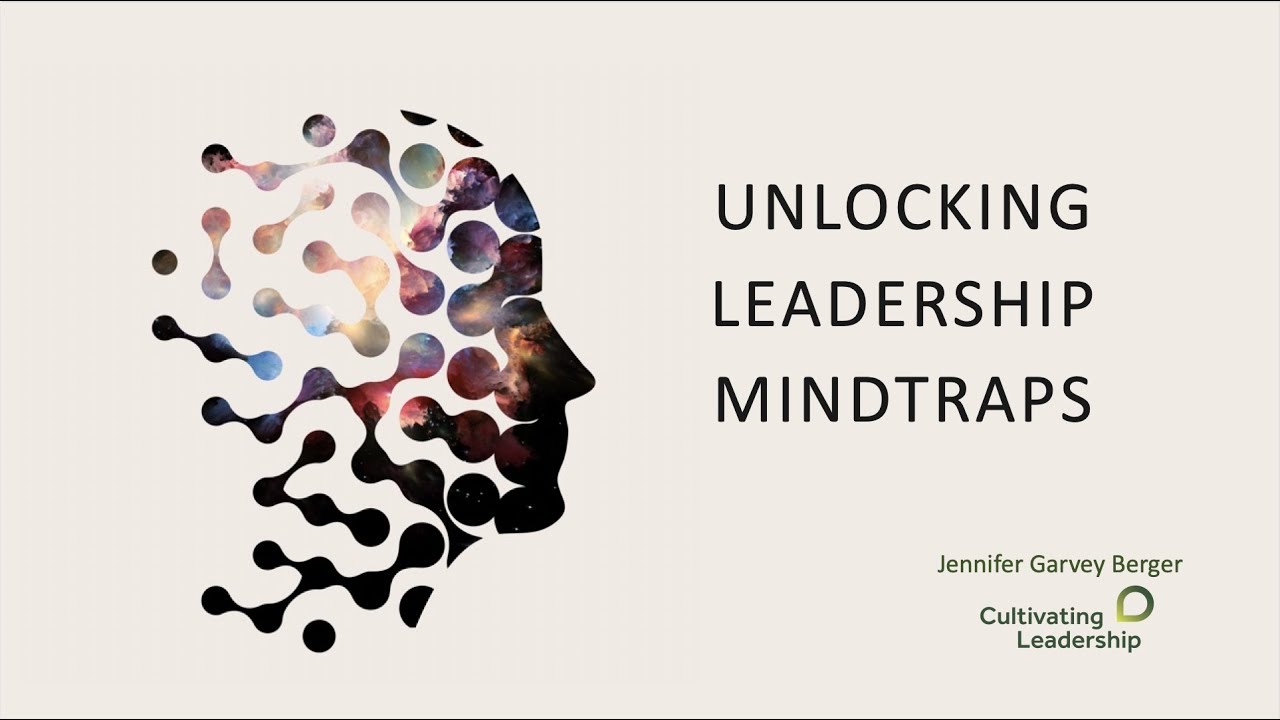
In her concise must-read book, Unlocking Leadership Mindtraps: How To Thrive In Complexity (affiliate link), Jennifer Garvey Berger explores five human quirks that help us through life, but in complexity cause more problems and lead us down problematic pathways that amplify our complicated situations.
In this monster article, I'm going to explore the book content and these introduced concepts while also listing multiple resources to help you understand, apply, and share them with others.
Let's start by quickly surveying the five quirks that easily become mental traps.
What Are The Five Complexity Mindtraps?
In brief summary, here are the five Mindtraps we humans tend to fall right into, and the ideas we'll explore further in this blog post.
-
Trapped by Simple Stories: Your Desire for a Simple Story Blinds You to a Real One
-
Trapped by Rightness: Just Because It Feels Right Doesn't Mean It Is Right
-
Trapped by Agreement: Longing for Alignment Robs You of Good Ideas
-
Trapped by Control: Trying to Take Charge Strips You of Influence
-
Trapped by EGO: Shackled to Who You Are Now, You Can't Reach for Who You'll Be Next
Likely, you can easily understand and relate to these traps and quickly think of when and where you and others have fallen into them. If you've entrenched yourself in the political realm, you're more than familiar with them 🙂
The content in this Mindtraps book is familiar to me because so much of it is embedded in Christianity. From the story of Genesis (Adam and Eve's Ego, and their hiding from God) to the writings of the Apostle Paul (letting go of control and experimenting at the edges), I'm seeing the patterns, and I highly value explicitly teasing out the principles as Garvey has done throughout this book.
To explore these Mindtraps further, you can read this introduction to them by Jennifer on her blog here, or watch the following webinar from her organization's Youtube channel (Cultivating Leadership).
I've extracted several elements from the preceding video in the content below to make it quickly accessible and to share it in an easily referable way. Let's start with a short story poem shared by Garvey.
Autobiography In Five Short Chapters by Portia Nelson
I.
II.
III.
IV.
V.
As someone who generally steers away from and is not usually interested in poetry, this poem struck me as to how much I related to the message. Reading it made me feel like, "that's me!" at each step along the way. Anyone that's had (or currently has) a chronic weakness, pitfall, or addiction will relate to the progression of the story.
The last line, "I walk down another street." piercing me in its simplicity of how simple the solution is while the poem also illuminates how hard it truly is to get there. That conundrum is a wonderful idea the book explores. But, before we dive deeper into the Mindtraps, it's helpful to grasp an understanding of complexity as a concept.
"...We need to take some of the brilliant design and purposefully reshape it to be fit for the unpredictable future that is unfolding. When we do this, we find that not only does the complex world of today seem less overwhelming, but we also solve problems more effectively, our relationships improve, and we even like ourselves better. Come see how." - Jennifer Garvey Berger
What Is Complexity?
"...our human instincts, shaped for (and craving) a simple world, fundamentally mislead us in a complex, unpredictable world."- Jennifer Garvey Berger
With a love of frameworks, I gravitate towards an appreciation of this one (the Cynefin framework) that spans predictability and unpredictability across a manageable spectrum. It's also helpful to recognize we can take steps to harness the predictability of both the obvious and complicated, but dealing with the chaotic and complex require a different set of skills, and ones that are not always clear. Often, it's simply our sheer will and perseverance through these unpredictable areas that help us through them. With a foundation of complexity in place, let's shift gears back towards the Mindtraps.
"Unwittingly stuck in a trap, we tend to believe we should simply try harder rather than try something else. We need help to find the traps and then escape from them." - Jennifer Garvey Berger
The Five Quirks and How They Become Traps (A Deeper Dive)
"Understanding new ways to notice and escape these Mindtraps turns out to be a kind of superpower that allows you to see new opportunities, create new solutions, and move forward with more finesse and less angst." - Jennifer Garvey Berger
Operating in complexity, we are trapped by...
-
Simple Stories
-
Rightness
-
Agreement
-
Control
-
Ego
"I would read cheerful books about uncovering and following your intuition, and inwardly I'd be screaming, 'Noooooo! Do not follow your intuition - It's broken beyond belief!' But, of course that was simplistic too (because as you see, I am irrational and biased and simple-making as the rest of the human race) " - Jennifer Garvey Berger
The following graphic provides a summary of each Mindtrap as well as the key question and habits we'll explore further on this blog post. Click the image or button below it to download a printable PDF of this file for quick future reference.
The Five Mindtrap Summaries
While awareness of these traps is not enough to free us from them (It requires awareness, practice, accountability, and ultimately, a ladder to prevent and escape), it is an important starting point to begin the process.
So to begin that process, here are the five traps again, with a quote from their description in the book.
1. Trapped by Simple Stories: Your Desire for a Simple Story Blinds You to a Real One
"Leaders who put too much faith in their heroic tales of the past and project simplistic versions of the future can be alluring - and ruinous. To escape we need to find our way out of our simple stories and back into our complex real ones." - Jennifer Garvey Berger
Garvey writes about this Mindtrap in summary on her blog, here (When our instinct for a coherent story kills our ability to see a real one).
2. Trapped by Rightness: Just Because It Feels Right Doesn't Mean It Is Right
"...Because we believe in what see, and we don't notice those things we don't see, we have a sense of our being right about most things most of the time... When leaders believe they are right in a complex world they become dangerous because they ignore data that might show them they are wrong; they don't listen well to those around them, and they get trapped in a world they have created rather than the one that exists." - Jennifer Garvey Berger
Jennifer explores this Mindtrap on her blog, here (When our instinct to believe we are right closes us off to the ways we are wrong).
3. Trapped by Agreement: Longing for Alignment Robs You of Good Ideas
"Too much agreement, while pleasant, makes us follow a narrow path rather than expanding our solution space. It makes it harder to prepare us for whatever the uncertain future demands...With complexity, we need diversity of experience, approach, and ideas, and we need to learn how to harness conflict rather than push it away." - Jennifer Garvey Berger
Explore what Garvey says in summary about this Mindtraps on her blog here (When our instinct to get along drives us apart).
4. Trapped by Control: Trying to Take Charge Strips You of Influence
"When we care about big, complex, intertwined issues, leadership requires the counterintuitive move of letting go of control in order to focus on creating the conditions for good things to happen - often with outcomes better than we had originally imagined." - Jennifer Garvey Berger
5. Trapped by Ego: Shackled by Who You Are Now, You Can't Reach for Who You'll Be Next
"When we try to defend our egos rather than grow and change, we end up perfectly designed for a world that happened already, instead of growing better able to handle the world that is coming next." - Jennifer Garvey Berger
Pay Attention to the Tension
"You have participated in all your bad decisions. A single bad decision is always the first step toward becoming your own worst enemy." - Andy Stanley
Staying on topic, but shifting perspective when it comes to the mental traps we fall into, I'm sharing part one of a video series from Andy Stanley where he talks about "How NOT to be your own worst enemy." The timing of my read of Garvey's book and Stanley's message was perfect, as they both tackled the topic from different but similar angles. In this 3-part video series, Stanley explores three preemptive habits (much like Jennifer does in her book). While watching these messages, it felt as if he was speaking right out of the Mindtraps book.
Our first habit is to pay attention to the tension, and instead of selling ourselves, start listening (Listening to unlock as Garvey states it). This video is an insightful introduction to the Mindtraps we'll explore in-depth, while also providing helpful wisdom to notice and respond when we begin falling into them.
And, with that watch and preceding insights, let's dive deeper into the first Mindtrap, Simple Stories.

Photo by Sydney Sims on Unsplash
1. Trapped by Simple Stories: Your Desire for a Simple Story Blinds You to a Real One
"The bad news is that our automatic stories are possibly too simple for a complex world... We believe stories have a beginning, middle, and end and we connect cause and effects...we understand cause-and-effect relationships, but we overuse that skill by creating fairly simple connections between cause and effect and then believing in those connections." - Jennifer Garvey Berger
If you've seen The Office, you're more than aware of how often our characters easily fall into one of the many Mindtraps. In the preceding video clip, Dwight starts to track several clues in addition to buying into Jim's fake evidence to convince him that a bat is transforming Jim into a vampire. This quite easily brings to light the following quote from Berger.
"If there are random dots scattered somewhere, we'll create patterns, name them, and create stories about them." - Jennifer Garvey Berger
"...once we have a simple story in place, we try to use that to reward the heroes and punish the villains and ensure this never happens again... We project forward from the past into the future and fill in missing pieces so it all makes sense. To create our simple stories, we pick and choose the data we remember, and we add in little bits of data if it makes for a better case." - Jennifer Garvey Berger
While there are numerous examples from my own journey where I've done this to others (unfortunately), it's a recent experience with a client where I've witnessed and felt this "punish the villain" simple story. My former client started with a few pieces of information and quickly convinced himself of things that were not true. Despite his staff and my attempts to get to the heart of the matter, this person isolated and bunkered down launching "metaphorical grenades" at me. This person made a predetermined choice and found the information that helped justify their poor decisions while dishonoring me and others through the process.
"You look for patterns from the past that you project into the future; if you can't find enough data, you make it up; and then you believe that you know what's going to happen next in your story! And then (if you're like me) you can start getting anxious about it and whipping yourself into a froth." - Jennifer Garvey Berger
"People who are closest to you are usually harder to describe, but people at a slight distance become somehow easier to understand. It is easy to cast the person across from you as the villain in your story without remembering that she is the hero in her own story."
"Life, so full of contradictions and surprises, rarely ever makes complete sense. The pieces of the puzzle seldom fit together perfectly. When they do - beware." - Peter Coleman
Keys To Unlock Simple Stories
"Interrupt yourself when you start to believe in them and they constrain your world." - Jennifer Garvey Berger
So, how do we prevent ourselves from falling into this trap? And getting out when we do?
With a simple question and habit.
But, before jumping into them both, I'd like to share this insightful Ted Talk by Lori Gottlieb on the topic of Simple Stories. In this informative video, she shares two perspectives about the same story with dramatically different results. It's in her talk that we get a clear picture of just how dangerous and easily persuaded we are with Simple Stories.
"The first to speak in court sounds right— until the cross-examination begins." - Hebrew Proverb
Key Question (To Escape Simple Stories): How Is This Person A Hero (instead of assuming they're the villain)?
In a world where we can so easily and commonly paint someone antagonistic to our point of view as the villain, it's often in these moments that we ought to ask ourselves how those people are instead, the hero in their own story. As much as we'd like to push back, the reality is that no one sees themself as the villain of the story. There is some cause, mission, or reason that makes sense of what they are doing and how they are behaving. So, the next time someone says or does something the causes you to quickly judge them in a negative light, pause for a moment and look at the situation more holistically.
To inspire you to take a step back from so easily and negatively painting others harshly, check out the following video for a glimpse into what may truly be going on under the surface.
Key Habit: Carry Three Different Stories (Don't just stick with the first ill-intentioned one).
And on that note, when we're spurring ourselves into an out of control anxiety spiral as we speculate about the unknowns of our situation or some ambiguous instance with another person, let's not sit solely with the worst-case scenario, but also consider the variety of other explanations. Just because we can connect all the dots doesn't mean the dots are connected.
"The point is to notice simple stories. Remember, they are simple, believe in them less, and use this habit to multiply the options you are considering. The point is to understand that in a complex world a simple story is just about always wrong, and will just about always lead us to an emaciated, impoverished set of choices. Escape the simple stories strap for a cornucopia of possibilities in a complex world." - Jennifer Garvey Berger
In the following video (part 2) from Andy Stanley's series, How NOT To Be Your Own Worst Enemy, Stanley explores how we need to pay attention to our narratives (as they drive our behavior and justifications).
What's the story we're telling ourselves?
And how is that story affecting our thoughts, beliefs, and actions?
"We are to wage war on flawed conclusions based on false assumptions." - Andy Stanley

2. Trapped by Rightness: Just Because It Feels Right Doesn't Mean It Is Right
"Your sense of being right about something, the sparkling clarity of certainty, is not a thought process, not a reasoning process, but an emotion that has nothing to do with whether you are right or not." - Jennifer Garvey Berger
This funny comic strip from Dilbert quickly illuminates the Rightness trap, and how easily we can fall into it (especially when we're young). The following visualized concept (Dunning-Kruger Effect) provides another insightful way to look at the trap of Rightness.
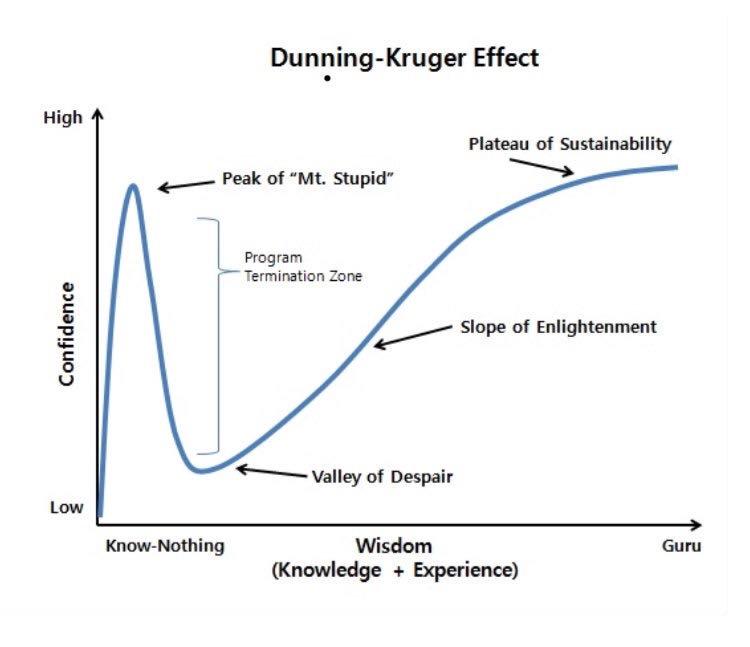
The effect illuminates our level of confidence which first comes from knowing a little, while the other peak comes from becoming an expert. But, in both cases, we can feel quite confident that we are right. And while that likelihood we're right increases on the second peak, both levels of confidence does not mean we are actually right. It also seems that when we're young, it's the first peak we're so easily inclined to live arrogantly.
As I've become more skilled and experienced in life and work, I've found its more challenging to step back and recognize even when I am (or feel that I am) an expert, doesn't guarantee that I'm right, or that my history is relevant to the present moment or future. I'm just as fallible as ever.
"Believing we're right leads us to march confidently in a determined direction - which might be off the edge of a cliff." - Jennifer Garvey Berger
The seduction and danger of rightness.
"Despite how certainty feels, it is neither a conscious choice nor even a thought process. Certainty and similar states of 'knowing what we know' arise out of involuntary brain mechanisms that, like love or anger, function independently of reason." - Robert Burton
Yep, it feels good to be right. To know the truth or at least a shade of it. What's worst is that we feel no different when we are 'NOT right (as long as we think we are).
But what does rightness really give us? Honestly, feeling like we are the right one often causes harm as we elevate ourselves and disassemble others. And, so much of what we tend to believe we're right about is more subjective than objective.
"Our experience of rightness kills curiosity and openness to data that proves us wrong... We are sure we're right, and so we don't notice (or we discard) any data that might suggest we're wrong." - Jennifer Garvery Berger
While Rightness can certainly aid in our pursuit of control or protecting our ego, the numerous downsides far outweigh the seeming benefits we get by feeling like we're right. Our absolute certainty closes us off from the potential of learning and growing.
In the book, Garvey asks us to remember a moment when we're absolutely certain about something. Then, imagine a new stranger entered the room asking a variety of questions about this topic you are so completely certain about. Which of the following is your natural emotional reaction to the questioning?
- Are you annoyed and offended that someone is even asking you these questions?
-
Are you defensive but confident that you're right?
-
Or, are you open and curious to explore how you could be wrong, and that you could learn more?
Obviously, we're likely to fall into one of the first two buckets. It takes an abundant amount of maturity and practice to respond effectively in the third posture.
"No one ever answers with the third response. That's because our sense of rightness not only changes what we think; it changes how we behave...Agree with me and you're right. Disagree with me, and you're complaining." - Jennifer Garvey Berger
Keys To Unlock Our Rightness
"The only reason it's a Mindtrap is because that feeling of rightness is unfortunately unconnected to whether we are, in fact, right." - Jennifer Garvey Berger
Have no fear, we can overcome our incessant need to be right. Like all the other Mindtraps, Berger leaves us with a key question and habit to crawl our way out from the hole we've fallen into (like the doctors who endorsed this cigarette ad from decades ago).

Key Questions: What do I believe and how could I be wrong?
"Naming these as our beliefs opens up the possibility that we or others could have other beliefs and not simply be wrong." - Jennifer Garvey Berger
This powerful key question is an open door of possibility to unraveling our need to be right. First, by asking what we believe, we're forced to articulate what that actually is. What sits in our mind is not so easily articulated verbally, or more importantly, in writing.
And, by clearly stating our belief, it also implies this belief is based on something. So, whether we dive into this truth ourself, or someone else does, the exercise can be a powerful one if we allow it. In the end, we most likely will end up with a more complete understanding than where we began.
Key Move: Listening to learn
"Much of the time we listen to win. You know, the kind of listening that tries to make you right and the other person wrong... The second most common form of listening we think about is listening to fix...Listening to learn requires we watch our assumptions that we are right (and we can either make the problem go away by winning or make it go away by fixing) and instead believe that the other person has something to say that we don't understand and therefore can't immediately help or make the problem go away. Listening to learn requires that we hold off and try to deeply understand for a few minutes." - Jennifer Garvey Berger
This quick watch video is a wonderful reminder of just how often we listen to fix or win. And as someone who considers his superpower listening, I'm still often failing to listen in this relationally oriented and fruitful way. Recontextualizing what it means to be incorrect about something helps soften the blow to our ego, and actually gather the feedback that could help us transform for the better.
"We are wrong about what it means to be wrong. Far from being a sign of intellectual inferiority, the capacity to err is crucial to human cognition. Far from being a moral flaw, it is inextricable from some of our most humane and honorable qualities: empathy, optimism, imagination, conviction, and courage. And far from being a mark of indifference or intolerance, wrongness is a vital part of how we learn and change. Thanks to error, we can revise our understanding of ourselves and amend our ideas about the world." - Kathryn Shultz
Clarity in a Confused (and Complex) World – Abdu Murray
In this thirty-three-minute talk, author Abdu Murray explores the collision of facts and feelings in our now post-truth culture. How do we navigate a context when truth matters less than a preference? Murray provides us some insights and shares his stories on how we can effectively navigate this often confusing (and anxiety-inducing) path with a strong reference point.

Photo by Clay Banks on Unsplash
3. Trapped by Agreement: Longing for Alignment Robs You of Good Ideas
"[Matthew] Liberman found that social pain - from the biggies like heartbreak and rejection to the more daily pain of thinking people don't like you or that you're being left out -- is experienced in the brain in the exactly the same way physical pain is experienced... You can see why our aversion to social pain could push us toward a sort of false agreement if we feared being rejected in some way." - Jennifer Garvey Berger
How often have you been in a situation with another person where they said something you disagreed with, but yet you said nothing? In fact, you not only didn't speak up against them, but you also nodded, signaling your (false) agreement with them. What about a boss, or a colleague who set out on a direction you believed would be problematic or traumatic for the company, and yet you went along and agreed with it?
The truth of the matter is that we humans want to agree with others, and often it's hard (as well as painful) to disagree with those in authority or that we care about (at least for most people). But what we often lose in that agreement is great ideas and stronger relationships.
This is the trap of agreement.
Imagine for a moment the Chinese finger trap. You place two fingers inside. As you pull out your finger, the trap grasps onto your phalanges, not letting them go. To successfully free your fingers requires pulling both fingers against each other in a slow and isolating way. If one finger pulls a direction and the other simply goes with it (agree) you won't have the tension to successfully get out of the trap. And, this is how it unfolds when we don't participate and allow the tension of disagreement and dissent in the things that matter most to us, including our work.
The seduction and danger of agreement
"All of this means that we withhold contradictory data so necessary to finding good solutions in complexity. We drive disagreement underground. Without the clashing of perspectives, we get far fewer options for action. In fact, we try to merge our perspectives and compromise."
Rejection is an unpleasant feeling. Disagreeing with others is relationally risky, especially if we've been involved in relationships where we're punished for speaking up and out.
As leaders, we press our authority on those who follow us in ways that suppress disagreement and we don't even realize it. To encourage others to provide feedback, especially those resistant to providing it, we must invite disagreement. Before sharing our ideas, let us ask others for their feedback. Paint a picture and craft a culture that roots out bad ideas and elevates the best ones.
And, as much as we like to think compromise is a worthy endeavor for when we face disagreement, often it actually generates worse results in complex situations. Garvey expands in the following quote.
"So, while compromise might feel fair, in complex situations it's often the wrong way to go because compromise tends to merge two options into one. In complexity, having more options is always better, because you can't possibly know beforehand which options will actually pay off. So the urge to compromise in complexity takes you from two viable options to one potentially mediocre one." - Jennifer Garvey Berger
Dare to Disagree
In what is one of the best Ted Talks of all time and has had a powerful impact on my own life, Margaret Heffernan explores the disagreement that has been driven underground and the drastic consequences it has had for many people over the course of history. For us to disagree, and to speak out is a form of Love, as Margaret puts it in this profound talk.
Keys To Unlock Our Simple Agreement
Key Question: Could this conflict serve to deepen a relationship?
"Resolution is about understanding one another more deeply so that you can come to a third way together, a way neither of you had considered before." - Jennifer Garvey Berger
This insight reminds me of how my wife and I bought our first home. We had a disagreement about it. She wanted to proceed, and I wanted to have certain financial thresholds established. We were at a standstill, but instead of saying no to moving forward, I said yes, but within guidelines. We worked together to get on the same page, resolve certain unresolved issues, and achieve specific financial goals. When we did this, we moved forward with buying a home, and that home buying process followed in a similar way where we disagreed on things. After surfacing the root desires and concerns, we ended up with a house in an area that neither of us would have chosen on our own, but a better third option we didn't even know was available.
And through this process, we became closer. Who would have thought that disagreement and conflict could actually foster deeper relationships? I think this is why when relationships do end in severe conflict, it hurts so much. To end something requires going to deep places. Ideally, we channel this into growth instead of death, but it doesn't always work out that way.
Key Habit: Disagree to expand
"Just as we can engage in conflict to deepen our relationships, we can disagree with one another in order to expand the possibilities...pushing forward in two or three or five directions simultaneously - in small ways - would be better than putting all their chips on one bet and hoping that one worked." - Jennifer Garvey Berger
As Garvey clearly and concisely puts it, disagreeing with others, even as an exercise of discovery (when you don't actually disagree) will provide us better options in the project, team, and business. The world we live in is ratcheting up in complexity and we've passed the point where we can figure these things out on our own. We must have the collective brainpower to survive and thrive.
4. Trapped by Control: Trying to Take Charge Strips You of Influence
"We substitute what can be measured for what matters. We believe we have more control than we do (or anyone does). We constrain possibilities of those things we can control, leaving little room to dream." - Jennifer Garvey Berger
As funny (or depressing) as that video is, there’s a piece of all of us in it and it’s because we all like to be in and take control. It's simply a matter of degree on how far we're willing to go, and what we're willing to do to others (for good or ill) along the way that differentiates us. What we often fail to recognize in the moments we assertively take control is the lost long-term benefits from losing influence over the people involved.
Cashing out a retirement account like a 401k or an IRA prematurely comes to mind as a good parallel. When taking money out of these accounts before maturity, there are penalty fees and additional taxes for pulling out that money. While it may feel better at the moment to have that money now, several months or years later we'll quickly come to regret the decision when we realized there was a twenty percent (or more) cost to doing so.
"It would be fabulous if we could give up control of the less important things, like whether our kids brush their teeth for exactly three minutes as dentists recommend, in exchange for controlling the more important things, like whom they hang out with at lunch and whether they smoke pot behind the toolshed after school." - Jennifer Garvey Berger
When you're kids get older and have more autonomy, will you rather have a strong level of influence on their life going forward or the satisfaction that you overly controlled their lives (protected them, as you say) as they grew up?
When your company is facing a difficult timeline altering fork in the road, do you want to have that quality influence over your team or will have aggressively asserting control (to always get your way) in the preceding years have been worth the loss of influence needed to make that shift?
"...Holding too tightly when we cannot be in control actually makes things worse." - Jennifer Garvey Berger
The Seduction & Danger Of Control
"Our reflex is to blame people when things look out of control, or when the outcome was not what we wished for. All of these controlling Mindtraps ironically decrease our ability to shape things in a complex and unpredictable world." - Jennifer Garvey Berger
What's helpful in the video above is understanding how much we often have little or no control in the system we find ourselves within. It's often more complex than we realize. But as true as this may be, our tendency when we feel out of control is often to assert, often to the detriment of ourselves and others.
"Most of us feel like we don't have enough control over those things that are important to us, so we figure that we're either doing it wrong or that someone else has the real power around here...stop believing in the myth that someone, somewhere is fully in charge and begin to believe in the myriad of forces that combine to create the future....while people have influence over the outcomes we seek, none of them can control those outcomes." - Jennifer Garvey Berger
Keys To Unlock Our Need For Control
"Instead of craving control, in complexity, we have to shift thinking about influence. We will not be able to make things happen, but we can be thoughtful about how we support the emergence of the things we want." - Jennifer Garvey Berger
There are limits to what we can control, but when we let it go, it's freeing. I remember how terrifying the transition to end my company and move forward was. But, after doing it, it was powerful to recognize that I was never in control, to begin with! I realized what was already true. From this understanding, it helped me focus on what mattered and where I could influence my future and relationships.
"One of the quirks with control in a complex world is that a direction (like 'more self-sustaining') is way better than a narrow destination or target." - Jennifer Garvey Berger
Key Question: What can I help enable? What could enable me?
In light of a recent customer situation, this question has been extremely helpful. When I feel out of control or unable to do anything about the situation, this question has a way of shaving off the edge of something that could be done.
And, it's also a powerful motivator to look outside our selves and help others. While I'm stuck, maybe I can help someone else? What's something I could do to enable them? Here are a few other variations of this question that can be helpful.
-
What' seems to enable the direction you most desire?
-
What sorts of things are inside your control that might enable your team to work together more collaboratively?
-
What would enable you to have the life you most want?
Key Habit: Experimentation at the edges
"When we open our horizons to direction rather than destination, and to influence rather than control, we can begin to think about genuinely experimenting - trying something where we really don't know what might happen next to see if it helps us travel in the direction we seek. We also want to experiment at the edges rather than at the very center of the issue. In complex systems the center is the most resistant to change, so it's best to stay away from it."
Experimenting is such a wonderful concept that I've fully embraced over the past six years of freelancing and blogging. This blog post is a book commentary which is part of an experiment I've been running here on the website. This will be my fifth book commentary post.
I've also been experimenting with interviewing people, different marketing tactics, writing books, and a variety of other things to help me personally grow. In the larger sense, my vocational path right now is a series of experiments as I seek to find out how to best get to my end game of writing and directing movies while staying responsible along the way.
By staying away from my core freelancing business, which generates a great income in an area I'm highly talented and experienced, I can experiment at the edges to learn things for that work while also moving towards my dream. It's a truly beautiful habit to embrace.
"Alter patterns, not outcomes. We need to notice the patterns that are creating the circumstances we dislike and then experiment at the edges to change those patterns (and of course we can notice patterns we do like and experiment to amplify those patterns). Then we will find ourselves learning about the system and also influencing it in ways that might just move us in the directions that turn out to be better than the destinations we had in mind in the first place." - Peter Coleman
 Photo by Kyle Glenn on Unsplash
Photo by Kyle Glenn on Unsplash
5. Trapped by Ego: Shackled by Who You Are Now, You Can't Reach for Who You'll Be Next
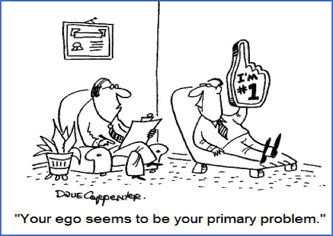
"Because so many of us don't think of ourselves as growing and changing into the future, we invest our energy into protecting the person we have become rather than growing into the person we might become next." - Jennifer Garvey Berger
It's an odd phenomenon that we humans do this. When I look back at my twenty-year-old self, I'm grateful for the maturity that's happened since then. The same is going to be true in another decade, and the ones that follow that too. But, I've spent an enormous amount of time protecting my identity, hiding my sins, and pretending to be better than I truly am.
"...most people are spending time and energy covering up their weaknesses, managing other people's impressions of them, showing themselves to their best advantage, playing politics, hiding their inadequacies, hiding their uncertainties, hiding their limitations. Hiding." - Jennifer Garvey Berger
We Don't Have A Sense of the Patterns of Our Life
"...get really interested not just in what someone knows but in how he makes sense of what he knows...the self-authored form of mind does not want to be written by our circumstances; we figure instead out how to pick up the pen to write our own story." - Jennifer Garvey Berger
Thankfully, my father modeled this type of discovery and question-asking. He wasn't content with just getting an answer, he wanted to understand what informed that answer. I've followed suit, always asking why and diving into the minds of my clients and friends (at least those who let me or don't run away). And recently, I've been leaning into listening and understanding the perspective of those who hold diametrically opposed views to my own. It's been a fruitful exercise in changing myself while also more deeply anchoring beliefs and ideas I do strongly hold. But, as much progress as I've made, there is a great deal of ego left to knock out of me.
"... the self-transforming form of mind... are always searching for the next thing that might challenge a deeply held belief system. They spend less time creating and defending a particular version of themselves and more time letting life transform them." - Jennifer Garvey Berger
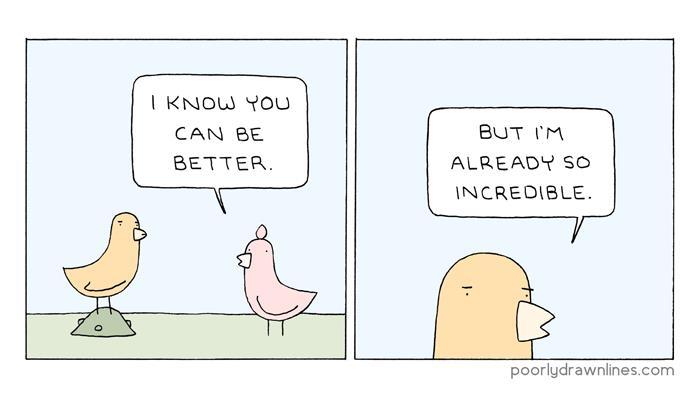
Keys to Unlock Our Ego-Protection Trap
Key Question: Who Do I Want To Be Next?
"Notice the difference between 'I'm just not that person who is inspiring at the front of the room' and 'Up until now, I just haven't been that person who is inspiring at the front of the room.' The first one means you can just go home. The second means that you're headed toward another possibility and that perhaps someday, in the not-so-distant future, you'll be that person who is inspiring at the front of the room." - Jennifer Garvey Berger
This has been a question in the final years of my marketing business, and one I've carried into the last six years as a full-time freelancer. Blogging my journey publicly as I explored this question, traversed different paths, and anchored into different answers. And while I've been through an abundance of transition over the past 14 years, I'm getting close to finally landing on an answer! But, as clear as I might feel that I am about certain things, keeping an open mind is a priority.
"Asking ourselves and others to think about who we will be next, keeps us from falling into the trap of believing we have arrived, and that keeps us living in a world of possibilities instead of creating and defending the current reality." - Jennifer Garvey Berger
In the preceding video by Andy Stanley, he explores listening as a key habit to overcome the traps we fall into. This is part 3 (the final part) of the How Not to Be Your Own Worst Enemy series explored in the previous sections. The video starts by exploring the genetic fallacy that has us discounting facts based on the source it comes from. What he goes on to say is that often we discount the wisest sources of insights in our life when we are thinking about and making terrible decisions in our life. It's quite relevant to the ego discussion.
Key Move: Listen to learn, from yourself
"Now that you are asking yourself about the person you will become, the next move is to look at the way you are making sense of the world." - Jennifer Garvey Berger
So, not only should we listen to others, we should listen to ourselves. Often, we discount or dismiss our own thoughts and feelings for the sake of others, but we do so to our own detriment. The adult development map will help us understand why we do this, and how we can move through it.
Adult Development Map
I was captivated when I first learned about constructive development theory from working with the Leaders Lyceum, a client who taught from this psychologically researched foundation. I eventually went through the program myself and read the co-founder's book, The Map.
Jennifer Garvey Berger is also an author and teacher of this framework, which she briefly summarizes in the following video.
In this clip, Jennifer is introducing us to constructive development theory which provides us a map on how we traverse the pathway of human maturity over time. To get where we are going, it's helpful to first know where we are on that map, and how we move forward on it.
Some key questions to help us grow and move forward can be found in the key question above, as well as the one listed below.
-
What is at stake for me here?
-
What's the hardest part about this?
-
What is the best part about this?
-
How do I know this is true?
Diving inside ourselves, to get clarity and self author is a powerful step in our progression. Eventually, when we're deeply anchored into that, it'll be important we let it go to explore the other possibilities that lie outside our own paradigm.
The following video from Charisma on Command is one last clip to explore the Mindtrap of ego, and how we can effectively overcome it with well-grounded confidence.
Building a Ladder to Escape the Mindtraps
As part of the final section of her Mindtraps book, Berger provides us with a framework for how we can prevent and overcome the mind traps in a more sustainable and effective way. I'll share a few quotes from each of the sections but I encourage you to pick up a copy of this short book on Amazon (affiliate link) to get the details.
I. Connect to Purpose
"We get so busy with the details that we forget to keep looking for the larger purpose of our lives. Without that larger purpose, we will struggle to find the keel that keeps us steady in the howling winds of change. And, it turns out, without the larger purpose, our lives are not only less meaningful but shorter too." - Jennifer Garvey Berger
Informed by my Christian upbringing, and inspired by Simon Sinek's Golden Circles, purpose and our why have been a pivotal part of my life's journey.
Knowing why I get up in the morning, why I go to work every day, why I lead my family and community, and why I continue living is a cornerstone of my life. And, it was essential to sustain the most challenging storms I've faced along my difficult journey.
If you've not articulated your life's purpose, written it down, and shared it with others, you're missing out on a vital tool to help you traverse life while also avoiding the many distractions that come along the way.
"Coming to terms with our mortality makes each day a little more precious and makes it more urgent for us to do something meaningful with the blink of time we have on this planet." - Jennifer Garvey Berger
II. Connect to Your Body
"Our bodies are constantly giving us signals that nearly all of us ignore. We need to be more connected to what they are telling us because they keep us grounded in what is rather than allowing our minds to trap us with what might or should be." - Jennifer Garvey Berger
Have you been in a meeting, sensing you need to say or do something? We physically and intuitively experience things we often can't quite articulate in the moment, but after the fact, we usually can think of what we wished we had done at that moment. In some cases in my own journey, it was responding to that impulse that prevented injury or possibly even saved my life. Our bodies are complex and helpful. Listening to them is an asset we won't want to ignore.
III. Connect to Your Emotions
"People who can name their emotions in nuanced ways (I'm anxious about this job interview but also excited and energized!) have surprisingly better outcomes in a wide variety of places than those who lump everything together (I'm super anxious about this job interview). " - Todd Kashdan
The quote above and below are so encouraging to me! In the time leading up to shutting down my marketing company in 2014, I was experiencing a trainwreck of emotions and I did not know how to handle or respond to it. But, I started writing and saying what I was feeling, what I think each emotion was, and what was causing it. As I did this more and more, I could more precisely understand when and what was coming, and how to direct it more effectively when it came. While the season was traumatic and difficult, this is one of the fruits that came out of the process that I'm hugely grateful for.
"It turns out that people who name emotional nuance are better able to recover from setbacks, can better manage their anxiety and sadness, and generally cope better with the unexpected difficulties of life." - Jennifer Garvey Berger
IV. Connect to Compassion for Yourself and Others
"If we hold these quirks as faults in ourselves or others, we'll be massively frustrated. Frustration and learning don't go together well and will get in the way of our even noticing that we have fallen into the traps - much less escaping from them. If we see them as a core and often-helpful part of our humanity, we face one another with compassion." - Jennifer Garvey Berger
Wrapping Up
I'm grateful to have stumbled upon the work of Jennifer Garvey Berger and read her book, Unlocking Leadership Mindtraps. It's a wonderfully practical tool to help us navigate the complexity in our world. And an easy share for equipping others.
Here they are one last time as I wrap up this lengthy exploration of the quirks that trip us up.
-
Trapped by Simple Stories: Your Desire for a Simple Story Blinds You to a Real One
-
Trapped by Rightness: Just Because It Feels Right Doesn't Mean It Is Right
-
Trapped by Agreement: Longing for Alignment Robs You of Good Ideas
-
Trapped by Control: Trying to Take Charge Strips You of Influence
-
Trapped by EGO: Shackled to Who You Are Now, You Can't Reach for Who You'll Be Next
Additional Resources To Explore
Book Commentary, Unlocking Leadership Mindtraps, Constructive Developmental Theory (CDT)
- Created on .
- Last updated on .
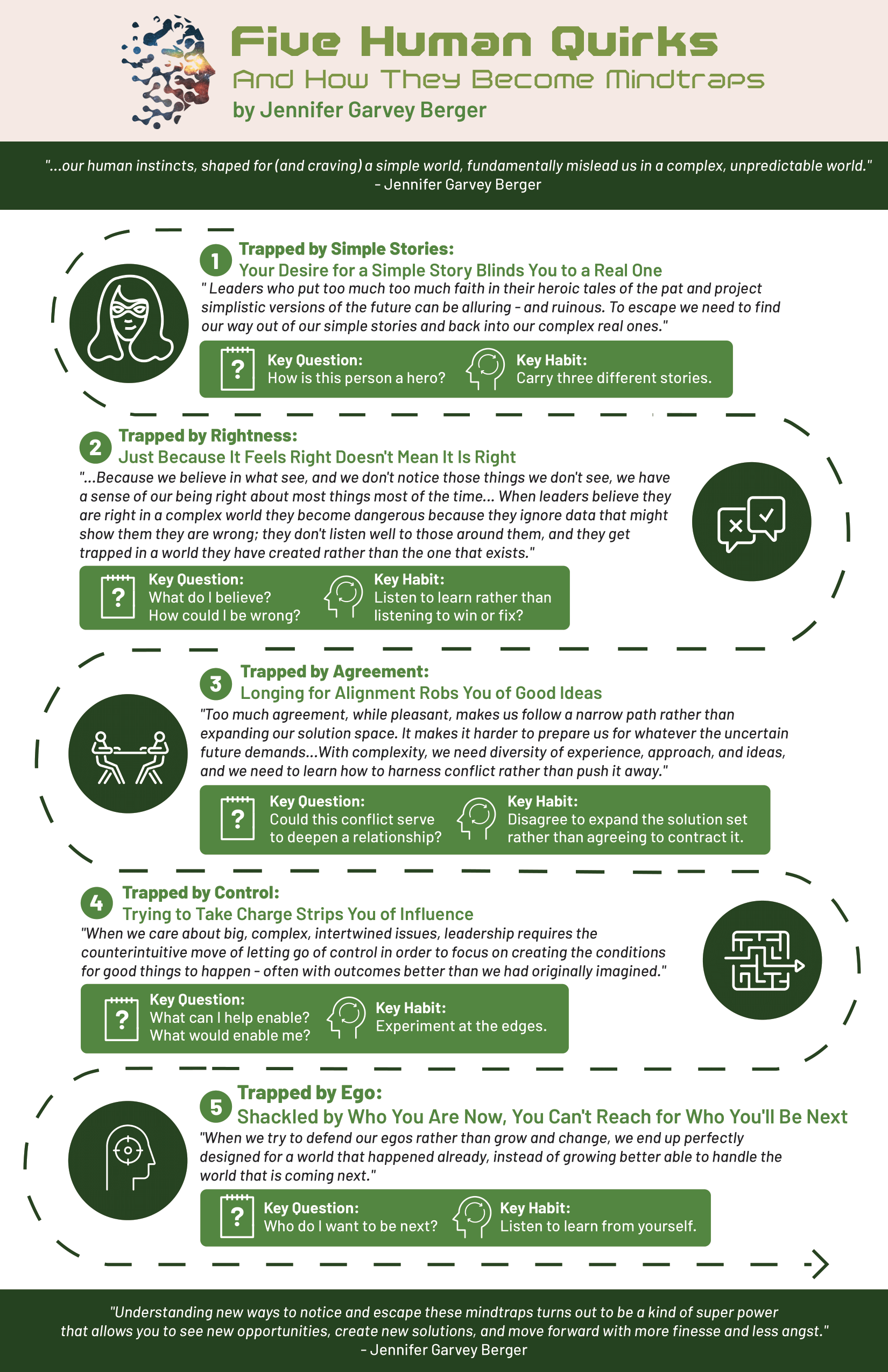

 Photo by
Photo by